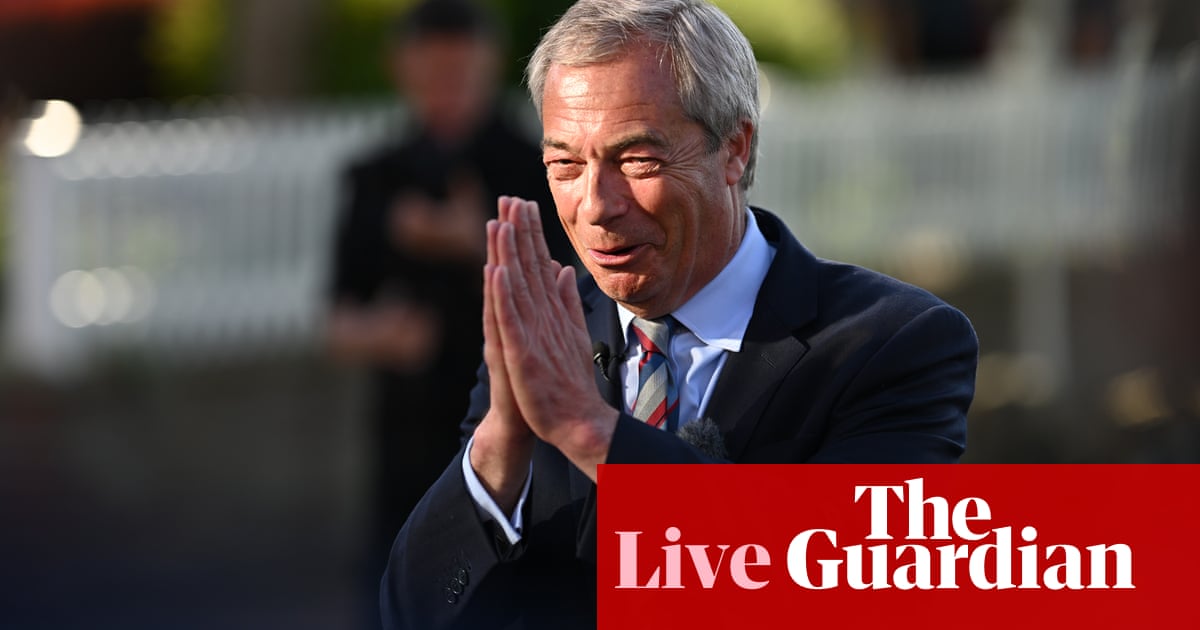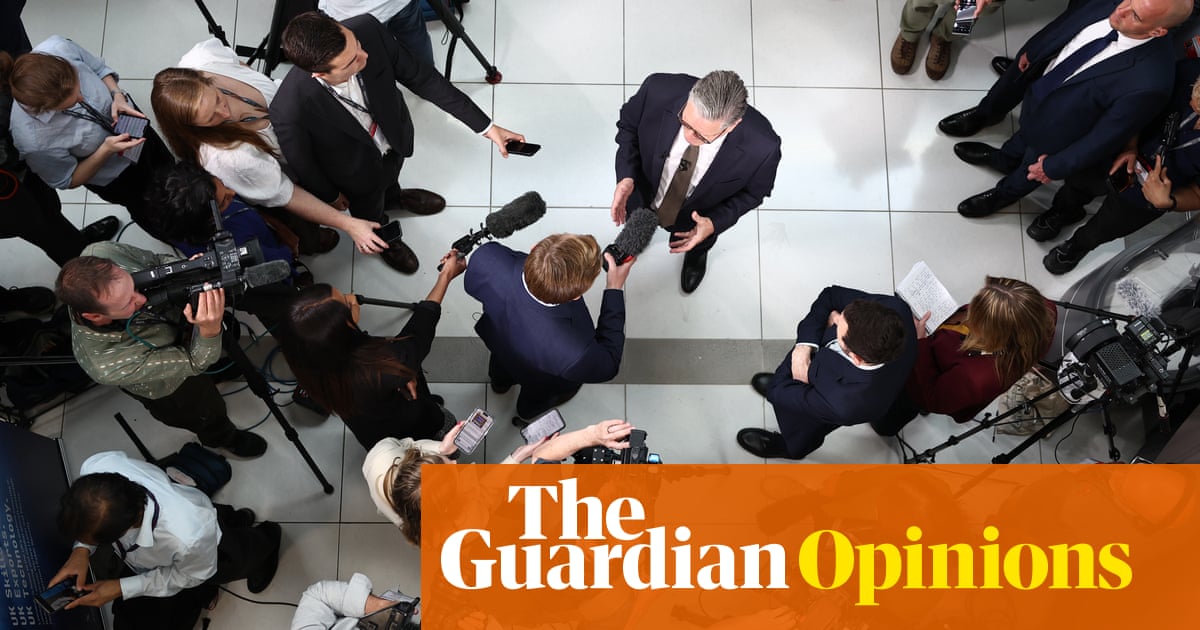Nigel Farage claimed he had broken the grip of Britain’s two main political parties as Reform UK gained an MP and swept to a string of victories in England’s local elections, making deep inroads into Labour and Conservative heartlands.
On a sobering day for Keir Starmer and Kemi Badenoch that brought immediate recriminations, Reform took hundreds of councillors from the struggling Tories and won the Runcorn and Helsby byelection by just six votes ahead of Labour.
In further signs of fracturing political loyalties, a BBC projection of how the voting would have looked in a UK-wide election put Reform first on 30%, Labour on 20%, the Liberal Democrats on 17%, the Conservatives fourth with 15% and the Greens on 11%.
An increasingly jubilant Farage said his hard-right populist party had now supplanted the Conservatives, as he pledged that Reform-run councils and mayoralties would block asylum seeker accommodation and, in a direct echo of Donald Trump, dismantle equalities programmes.
“We’ve dug very deep into the Labour vote and in other parts of England we’ve dug deep into the Conservative vote, and we are now, after tonight there’s no question, in most of the country, we are now the main opposition party to this government,” Farage said.
Speaking at a later rally, Farage said the elections marked “the beginning of the end of the Conservative party”.
Reform won in Runcorn and Helsby with a 17-point swing away from Labour, overturning a majority of more than 14,000. Its candidate Andrea Jenkyns, the former Conservative minister, easily won the new mayoralty of Greater Lincolnshire, and the party also took the mayoralty in Hull and East Yorkshire.
By late Friday, Reform had taken control of seven councils – Durham, Kent, Lincolnshire, Lancashire, Staffordshire, Nottinghamshire and Derbyshire – with a gain of well over 500 seats.
While moving from a protest party to one with responsibility for policy and delivery could bring risks, Farage used a victory rally in County Durham to pledge a pushback against equality and diversity programmes and allowing council staff to work from home.
“I would advise anyone who’s working for Durham county council on climate change initiatives, or diversity, equity and inclusion, or thinks they can go on working from home, I think you had all better really be seeking alternative careers very, very quickly,” he warned.
Farage also said Reform would resist asylum seekers being accommodated in Reform-run areas, while Jenkyns called for them to be placed in tents. “I say no to putting people in hotels. Tents are good enough for France, they should be good enough for here in Britain,” Jenkyns said, an apparent reference to the makeshift camps used by asylum seekers along the French coast.
A rout of Conservative councillors had been widely predicted, including by Badenoch, in part because the party had done so well the last time the seats were contested, during the short-lived Covid “vaccine bounce” under Boris Johnson in 2021.
But the shedding of so many seats – by late Friday there was a net loss above 50% – plus the fourth place in the projected vote share will place renewed pressure on Badenoch, whose insistence of a slow buildup on policy ideas has worried some of her MPs.
The Liberal Democrats made renewed gains in previously Conservative heartlands, taking control in Oxfordshire as the Tories lost 15 seats, and also taking over in Cambridgeshire and Shropshire. The Greens picked up dozens of new councillors and came third in the West of England mayoral race, one they had harboured hopes of winning.
More surprising was the scale of Labour losses, with the party losing proportionally fewer seats than the Tories, but with some major localised drubbings, such as a net loss of 38 seats in Durham and 27 in Lancashire.

Speaking on a visit to a defence factory in Luton, Starmer said: “What I want to say is, my response is, we get it. We were elected in last year to bring about change … I am determined that we will go further and faster on the change that people want to see.”
Labour officials accepted that some results had been bad but in part blamed a greater-than-expected collapse in the Tory vote, which helped Reform make gains in three-way contests.
A Labour source said there were some signs of government policies starting to resonate with voters, pointing to Ros Jones holding off Reform to keep the Doncaster mayoralty following central investment to reopen the local airport.
“Doncaster is a good example of the sort of muscular government that voters notice,” the source said. “When the PM says further and faster, it’s about positive change, now we’ve made the difficult fiscal decisions.”
It was nonetheless notable that Jones was among the most vocal critics of Starmer’s record on Friday, highlighting cuts to the winter fuel allowance as a subject stoking voters’ anger, as well as reductions in disability payments and a rise in national insurance.

Asked whether the prime minister was listening to her voters, Jones said: “I would say no. They haven’t actually realised, because the people of Doncaster know how hard life can be, and it’s about delivering for them.”
There was also criticism from a number of Labour MPs, albeit with those going public tending to be from the left of the party.
Others did join in. Ayesha Hazarika, a Labour peer and former adviser, said the party needed to “admit that some mistakes were made, like the winter fuel allowance”. Speaking on Times Radio, she said the result in Runcorn would “throw up some big questions about the strategy and the operation”.
When given anonymously, the verdict was particularly damning. One senior Labour MP said: “I was quite shocked at how complacent the campaign was, especially in Runcorn but nationally as well. Everyone seemed convinced we were going to win by a reasonably comfortable margin.
“The NHS message does not work against Farage, but the centre wouldn’t hear it, or the fact that Keir’s unpopularity was brought up on almost every door.”
A second Labour MP said: “The boys in No 10 should spend less time briefing about who’s driving the train and more time actually getting on with building the tracks.”
A third said: “It’s all very well for No 10 to say we’ve got to keep delivering. The problem is that it’s the stuff we’ve delivered that people hate.”

 14 hours ago
14
14 hours ago
14













































